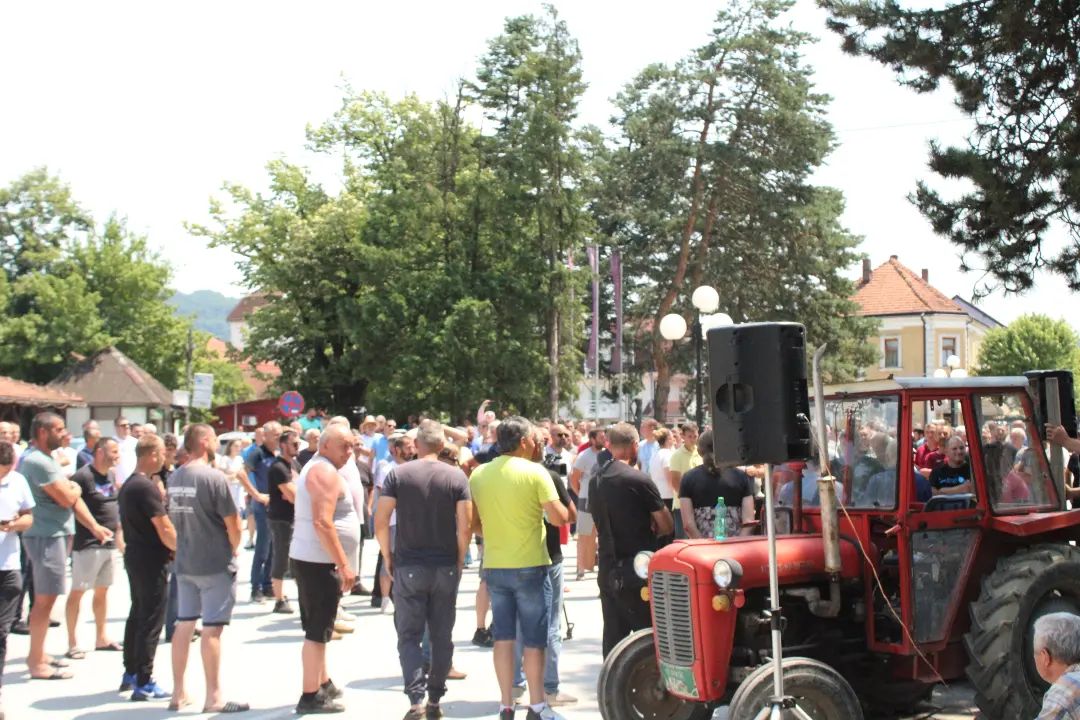Kad „nevidljiva ruka tržišta“ zavuče prste baš u tvoj džep
U Arilju, mom rodnom kraju, brdsko-planinskom području na jugozapadu Srbije nazvanom „ svetska prestonica malina“, proizvođači danima blokiraju lokalne puteve i hladnjače nezadovoljni niskom otkupnom cenom malina (cena je skoro tri puta niža od prošlogodišnje) i nepostojanjem jedinstvene otkupne cene.
Ariljski otkupljivači maline u svojoj istoriji imaju praksu kartelskog udruživanja, a proizvođači s druge strane dugu istoriju štrajkova praćenih prevrtanjem policijskih vozila, direktnih sukoba sa specijalnim policijskim snagama i otimanjem njihovih pendreka, performansima paljenja stotina sveća malinarskom biznisu i prosipanja malina po putevima, marševima do Beograda udaljenog oko 200 km i čak spavanja ispred Vlade.
Ove godine, međutim, štrajkovi nisu ni blizu masovni kao prethodnih godina. Razlog tome verovatno je neefektivnost prethodnih„ seljačkih buna“ . Kada su malinari spavali ispred Vlade (jutro kad je trebalo da krenu sa traktorima u Beograd pamtim kao najuzbudljivije u životu, polja jabuka uz magistalni put bila su prepuna specijalnih jedinica pod punom opremom koje nisu dozvolile da se krene traktorima, ali su malinari krenuli udruženo kamionima) država je izašla sa zvaničnim dokumentom o povećanju cene, međutim do isplate te povišice nikada nije došlo.
Postavlja se pitanje kako država sastavlja dokumente u kojima garantuje višu cenu malina i istovremeno u trenucima kad su malinari daleko od beogradskih kancelarija tvrdi da je tržište slobodno te da cena zavisi isključivo od ponude i tražnje i hoće li vlast zaista nešto uraditi da spreči propast srpskog sela.
U međuvremenu, ispod članaka o nezadovoljstvu malinara stanovnici gradova u komentarima pišu kako im je dosta malinarskog kukanja i kako, ako već ni jedne godine nisu zadovoljni, treba prosto da promene biljnu kulturu. A šta će da promene poljoprivrednici u Srbiji kad nezavisno da li gaje maline, kupine, jabuke, šljive, krompire, kupus ili neku drugu kulturu, pristojnu zaradu imaju svake pete ili šeste godine, a u međuvremenu jedva pokrivaju troškove proizvodnje ili ih uopšte ne pokrivaju jer često usled nedostatka tražnje oni jabuke i krompire u proleće iz magacina ruče pravo u potok.
Wenn die „Unsichtbare Hand des Marktes“ ihre Finger ausgerechnet in deine Hosentasche steckt
In meiner Heimatgemeinde Arilje, in einer gebirgigen Gegend im Südwesten Serbiens, genannt „Welthauptstadt der Himbeeren“ blockieren die Himbeerproduzenten tagelang die lokalen Straßen und Kühlanlagen, weil sie gegen die zu niedrigen Preise für Himbeeren protestieren (der Preis beträgt fast nur noch ein Drittel des Vorjahrespreises), und außerdem protestieren sie, weil es keinen einheitlichen Kaufpreis gibt.
Die Himbeerkäufer in Arilje haben in ihrer Geschichte schon mehrfach Kartelle gegründet, während auf der anderen Seite die Produzenten auf eine lange Geschichte von Streiks zurückblicken, im Zuge derer sie Polizeiautos umwarfen und sich unmittelbar Gefechte mit Sondereinheiten der Polizei lieferten, den Polizisten die Schlagstöcke wegnahmen, Hunderte Kerzen für das Himbeerbusiness anzündeten und Himbeeren auf der Straße ausschütteten, Märsche zur 200km entfernten Hauptstadt Belgrad unternahmen und sogar vor dem Regierungsgebäude übernachteten.
In diesem Jahr waren die Streiks allerdings nicht so massenhaft wie in den Jahren zuvor. Der Grund dafür ist wohl die Ineffizienz der vorangegangenen „Bauernaufstände“. Als die Himbeerproduzenten vor dem Regierungsgebäude übernachteten (den Morgen, an dem sie mit dem Traktor nach Belgrad losfahren sollten, ist in meiner Erinnerung als der aufregendste Morgen in meinem Leben abgespeichert, auf den Feldern mit den Apfelbäumen entlang der Straße wimmelte es nur so vor Spezialeinheiten in voller Montur, die die Traktoren an der Weiterfahrt hinderten, aber die Himbeerproduzenten taten sich zusammen und fuhren mit den Lastwagen los), da lenkte der Staat erstmal ein und legte ein offizielles Dokument über die Anhebung des Kaufpreises hoch, allerdings kam es nie zur Auszahlung dieser Preiserhöhung.
Es stellt sich die Frage, wie der Staat bloß in der Lage ist, offizielle Dokumente auszustellen, in denen ein höherer Kaufpreis für die Himbeere festgelegt wird, und zugleich immer dann, wenn die Himbeerproduzenten weit weg von den Belgrader Regierungsbüros sind, behauptet, der Markt sei frei und der Preis würde ausschließlich von Angebot und Nachfrage abhängen und davon, ob die Regierung bereit sei, etwas zu unternehmen, um den Niedergang der serbischen Dörfer aufzuhalten.
Inzwischen findet man im Leseforum bei Artikeln über die Unzufriedenheit der Himbeerproduzenten häufig Kommentare von Stadtbewohnern, die da schreiben, sie hätten die Nase voll vom Gejammere der Himbeerproduzenten, und wenn diese in keinem Jahr mit ihrem Einkommen zufrieden seien, dann sollten sie doch andere Pflanzenkulturen anbauen. Aber was sollen die Bauern in Serbien verändern, wenn sie doch, ganz unabhängig davon, ob sie nun Himbeeren, Brombeeren, Äpfel, Pflaumen, Kartoffeln, Kohl oder eine andere Pflanzenkultur anbauen, ohnehin nur jedes fünfte oder sechste Jahr einen ordentlichen Verdienst erzielen und dazwischen nur mit Mühe ihre Produktionskosten abdecken können oder gar nicht abdecken können, weil sie aufgrund fehlender Nachfrage häufig gezwungen sind, im Frühling ihre Äpfel und Kartoffeln direkt vom Lager in den Bach zu schütten.
Übersetzung: Masha Dabić
When the “Invisible Hand of the Market” sticks its fingers into your pocket, of all places
In my home village Arilje, in a mountainous area in the southwest of Serbia, referred to as the “world capital of raspberries”, raspberry producers block the local roads and cooling facilities for days because they are protesting against the too low prices for raspberries (the price is almost only one third of the previous year’s price), and moreover they are protesting because there is no standard purchase price.
The raspberry buyers in Arilje have a history of fixing prices and forming cartel-like associations, while on the other hand the producers have a long history of strikes, overturning police cars and fighting immediate battles with special police units, taking the batons away from the police, lighting hundreds of candles for the raspberry business – to symbolically bury it – and spilling raspberries in the street, marching to the capital Belgrade, 200 km away, and even spending the night in front of the government building.
This year, however, the strikes were not as massive as in the years before. The reason for this is probably the inefficiency of the previous “peasant uprisings”. When the raspberry growers camped out in front of the government building overnight (the morning when they were supposed to leave by tractor for Belgrade is stored in my memory as the most exciting morning in my life, the fields with apple trees along the road were swarming with special forces in full gear preventing the tractors from going further, but the raspberry producers got together and drove off with the trucks), the state gave in for the moment and issued an official document about the increase in the purchase price, but the promised price increase was never paid out to the farmers.
The question is how the state is actually able to issue official documents setting a higher price for the raspberry and yet at the same time, whenever the raspberry producers are far away from the Belgrade offices, the government claims that the market is free and that the price depends solely upon supply and demand and whether the government is willing to do anything to stop the decline of the Serbian villages.
In the meantime, articles about the discontent of raspberry producers are often accompanied by comments from urban readers who write in the forum that they are fed up with the whining of raspberry producers and that if the latter are not happy in any given year, then they should grow other crops. But what are the farmers in Serbia supposed to change when, regardless of whether they grow raspberries, blackberries, apples, plums, potatoes, cabbage or any other crop, they only earn a decent income every fifth or sixth year anyway and in between they can barely cover their production costs or cannot cover them at all because often in spring they are forced to dump their apples and potatoes straight from the storage into the river, due to a lack of demand on the market.
Translation: Masha Dabić
Teilen












